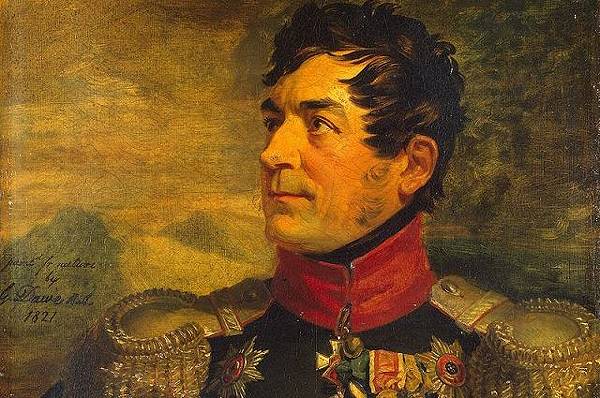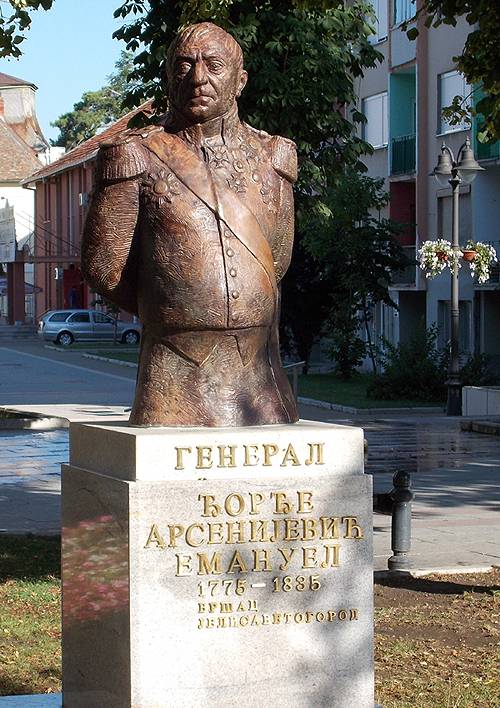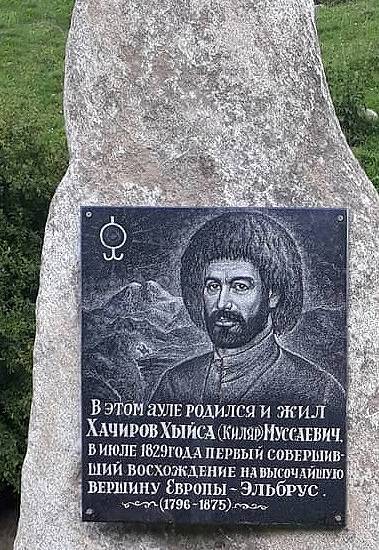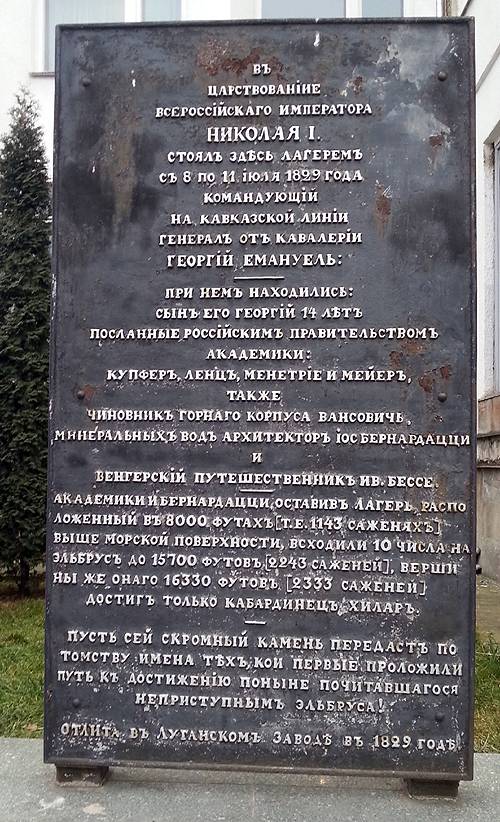General G.A.Emmanuel - Serbian nobleman in Russian service

In the Military "Gallery of Glory" of 1812, which is located in the Hermitage, among the portraits of heroes who fought against Napoleon in World War II, the portrait of General Georgy Arsenievich Emmanuel, hero of the Battle of Leipzig, occupies a worthy place. Fate brought him to the Russian Empire, which he served faithfully.
A Serbian nobleman by birth, Emmanuel began his military service in the Austrian imperial army at the age of fourteen. True, even before that, he managed to accomplish his first military feat.
When George was thirteen years old, Turkish soldiers invaded the small state of Banat, in which he lived. The frightened inhabitants of the town of Vershice fled. Young Emmanuel, together with his brother Simeon, created a militia from his comrades. Gathering in the city weapon, the young men posted guards and posts. And when the Turks approached, the boys sounded the alarm, prepared for defense and acted so decisively that the Turks passed by, thinking that there was a strong garrison in the city.

Monument to General G.A. Emmanuel at home in Serbia
In 1792, Emmanuel received the rank of corporal-junker in the Austrian army and took part in the campaign against France. Soon he received his first award - a gold medal with the inscription "For Bravery". Then George began to serve as a second lieutenant in the Hungarian noble guard.
In Russia
And on March 27, 1797, a young Serb, having parted forever with his native town of Vershitz, arrived in Russia in a Hungarian uniform and looked with curiosity at the watch parade on Kremlin Square. A 22-year-old foreigner with the rank of lieutenant, with the medal "For Courage" flashing on his chest, was a wise military experience, attracted the attention of Emperor Paul I, who invited the young officer to an audience on the same day. By this time, the Serbian nobleman had already experienced combat battles with the Turks and the French, survived hospitalization in Heidelberg, where he, who received severe wounds, was literally brought back to life.
Emmanuel arrived in Russia with knowledge of military sciences, speaking Italian, German and French. The audience of Emperor Paul I decided his future fate - Emmanuel was enlisted as a lieutenant in the Life Guards Hussar Regiment.
This was the beginning of the adventurous and successful Russian military career of George (Gyorgy) Emmanuel.
After the tragic death of Emperor Paul I, Emmanuel, with his characteristic devotion, began to serve the new emperor. Participated in cases against the French in the campaigns of 1805-1807. Received the rank of colonel on January 6, 1809 and was appointed chief of the Kiev dragoon regiment. But Georgy Arsenievich was able to show all his military talent only in the war with Napoleon in 1812.
In World War II, Emmanuel commanded the 2nd brigade (Kiev and Novorossiysk dragoon regiments) of the 4th reserve cavalry corps. He was constantly in the rearguard and was at the center of the battles all the time. In the Battle of Borodino, Emmanuel with his regiments settled on the Shevardinsky redoubt, where "he courageously attacked the enemy cavalry column, reinforced by infantry and attempting to stop a battery of horse artillery, and was wounded by a bullet in the chest." For this battle he was awarded the Order of St. George, 4th degree.
Georgy Arsenievich was being treated in Vladimir, but already in September, still not recovering from his wounds, he returned to the regiment. He took part in the Battle of Maloyaroslavets and in the case at Vyazma. Already on December 26, 1812, he was promoted to major general.
Pursuing the French already on Prussian territory, General Emmanuel forced such fortresses as Modlin, Glogau, Zwickau, and Bautzen to surrender.
During the Battle of Leipzig in 1813, with only a few platoons, the general found himself deep behind the front lines. Stumbling into a French battalion, he showed miracles of courage and thereby not only saved his soldiers from capture, but he himself captured Count Loriston, the former French ambassador to Russia.
Soon, the hero of the Patriotic War, Lieutenant General Emmanuel was appointed head of the Caucasian region and commander of the troops of the Caucasian line and Chernomoria.
Pyatigorsk
In the spring of 1827, the commander-in-chief of the Separate Caucasian Corps resigned from his post, the wayward Alexei Petrovich Ermolov, who began the construction of resorts on Hot Waters (Pyatigorsk). But Georgy Arsenievich did not "break" what was created by his predecessor, but only supplemented and finished what General Ermolov had begun.
In September, Georgy Arsenievich arrived in Stavropol and took command of the Caucasian Line, which was then in a difficult situation. Persia was preparing for war with Russia and incited the highlanders to robbery. The Turkish government also tried its best to incite hostility against the infidels.
G. A. Emmanuel was able to fulfill the main mandate of Emperor Nicholas I: to strengthen the Caucasian Line and to persuade neighboring peoples to good neighborliness. As a reward for his labors, and especially for maintaining peaceful relations with the highlanders of the borderlands, the emperor bestowed upon Emmanuel the Order of St. Alexander Nevsky.
But the imaginary idyll did not last long. His Majesty's idea of the Caucasus was as vague as that of his parquet generals at court. As soon as the Russian troops defeated the Persians at Elizavetpol, the Ottoman Port immediately revived, provoking the highlanders to raid the Line.
It seemed that a fragile peace had come to the North Caucasus, and it was possible to deal with civil matters that needed an urgent solution. And in the civilian field, Georgy Arsenievich showed his character. He did a lot for the regional city. On his initiative, a living room appeared in Stavropol, he took care of the cleanliness and improvement of the regional center. Emmanuel encouraged the factory industry, agriculture and animal husbandry. He was the first to organize the cultivation of forests in the area and taught its inhabitants to beekeeping, which became a significant branch of the national income.
It is very difficult to overestimate the role of General Emmanuel in the organization of the Caucasian Mineral Waters. The period from 1827 to 1831 can be called brilliant in the life of this resort region. Having received an order from St. Petersburg to head the committee for improving the resort area, the head of the Caucasian region made every effort to ensure that it was convenient for all visitors to be treated and relaxed here. And it is no coincidence that many military men who served in the Caucasian army strove to the Waters to rest in between campaigns.
A.S. Pushkin, during his trip to the Caucasus with the family of General Raevsky, having visited Hot Waters for a short time in 1829, saw this beginning of transformations. The results of Emmanuel's activities on the waters were summed up by M. Yu. Lermontov in his novel "A Hero of Our Time". Pyatigorsk turned into that “new, clean little town” that the poet loved so much.
But Turkey could not come to terms with its losses. The Karachay prince Islam Krym-Shamkhalov, together with the Turkish commander Magomed-Agoy, captured and defeated the village of Nezlobnoye near the city of Georgievsk. Their actions endangered the peaceful life in the Caucasian Mineral Waters. On October 20, the first and last battle with the Karachais took place on the Biychesan plateau, which ended in a Russian victory. The next day, the Karachai prince came to Emmanuel with a request for admission to the citizenship of Russia.
Elbrus
While serving in the Caucasus, Emmanuel, already a cavalry general (in today's understanding - colonel general), organized an expedition to Elbrus. This was in 1829. Before that, a man's foot had never set foot on its top. The expedition included four Russian academicians and the Hungarian traveler Janos Beschche, who later noted that General Emmanuel had become a loyal son of Russia.
During this expedition, military topographers made a map of the area and made numerous sketches, and the expedition itself ended with an ascent to Elbrus, and the date of July 11, 1829 opened the chronicle of Russian mountaineering. Petersburg scientists almost reached the top: the cold and loss of strength affected the climbers. The highlanders and Cossacks who accompanied them were exhausted before the Petersburgers. Emmanuel saw only one Kabardian (Karachai?) Guide, Kilar Khashirov, through the Dollan pipe on the ice summit of Elbrus.

Monument to the Elbrus climber Khashirov in Karachai
Upon returning to the camp near the river Malki Kilara, they were honored as the first climber to the highest mountain of the Caucasus. Emmanuel presented him with a piece of cloth and a hundred silver rubles. Georgy Arsenievich asked about the cherished desire of a free peasant, and Kilar, to everyone's surprise, asked to enroll him in the Caucasian half-squadron created by Emmanuel from the mountain nobility. Kilar was a commoner and, in order not to offend the brave highlander with a refusal, the head of the region assigned him to the Russian army.
In memory of the first ascent of Elbrus, Diana's grotto was built in Pyatigorsk, two supporting columns of which symbolize the two peaks of Elbrus.
The expedition returned in a different way, along the valley of the Kuban River, where they found lead and silver ores, sour and iron springs, and at the Khumarinsky post - outcrops of coal. These findings were of great importance for the future development of the Caucasian region.
The result of the research of scientists who were part of the expedition of General Emmanuel was so significant that the Imperial Academy of Sciences, as a sign of respect and gratitude, chose Georgy Arsenievich as its honorary member.

In 1829, at the Luhansk plant, in honor of the famous expedition to Elbrus by General Emmanuel, two cast iron plates were cast (with a similar text in Russian and Arabic). One of them was supposed to be installed on the rock, where the hero of the Patriotic War of 1812 set up his camp. Nalchik
Meanwhile, events were taking place in Dagestan that forced Russia to wage war in the North Caucasus for another long thirty years. In the aul of Gimry, imam Kazi-Mulla appeared, calling the mountaineers to ghazavat - a holy war against the infidels. Moreover, not only Russian Christians, but also Caucasian peoples, who lived according to their ancient laws and did not obey the Muslim Sharia, were declared "infidels".
In August, Kazi-Mulla's detachments were defeated by the Cossacks led by Emmanuel near the fortress Suddennaya. But for the general, the battle with Kazi-Mulla turned out to be fatal. He was seriously wounded and in August 1830 he returned to Stavropol physically weakened. In addition, he was tormented by other torments: his beloved son, who accompanied him on the Elbrus expedition, was with him in battles against Kazi-Mulla. He was wounded almost at the same time as his father - a bullet shattered the boy's leg.
The general spent about a year in the Caucasus. His health was slowly recovering. But he never returned to military activity. He devoted the last years of his life to the welfare of children.
Emmanuel always lived modestly, was a good host. This warrior, so formidable for enemies, was the most gentle and caring father and spouse. Everyone around him was content and happy. In his address, he was always meek, affable, courteous. He was never seen unfair or hostile, or even impatient.
Memory
The memory of General G. A. Emmanuele has forever remained in the resort town of Pyatigorsk. Even when he was the head of the Caucasian region on the slope of Mount Mashuk, near the Elizavetinsky mineral spring, the Emmanuelevsky garden appeared. It was along its shady paths that Grigory Aleksandrovich Pechorin, the hero of the novel by M. Yu. Lermontov, was walking.
The plans of Pyatigorsk at the beginning of the twentieth century indicated the name of one of the small streets - Emmanuevsky prospect. This name was given to the street in memory of a man who did so much for Russia, the Caucasus, Pyatigorsk.
Information